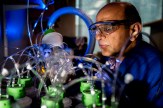Physicist’s work named one of the best by National Academy of Sciences
Northeastern physicist Albert-László Barabási has been awarded the Cozzarelli Prize by the National Academy of Sciences for authoring an original scientific paper that presents an outstanding discovery in the engineering and applied sciences category with important consequences for disease diagnosis and prevention.
The editorial board of the Proceedings of the National Academy of Sciences (PNAS) recognized “The implications of human metabolic network topology for disease co-morbidity” as one of the six most excellent and original works published in PNAS in 2008.
The paper provides insights into the human metabolic network by identifying the connections between diseases. By constructing a human disease association network, Barabási and his team found that the more connected a disease is to other diseases, the higher is its prevalence and associated mortality rate.
”Most diseases are the consequence of the breakdown of cellular processes, but the relationships among genetic and non-genetic defects, the molecular interaction networks underlying them, and the observable characteristics of these diseases remain poorly understood,” said Barabási, distinguished professor of physics and director of the Center for Complex Network Research at Northeastern. “Our findings have the potential to contribute to better understanding of diseases and we are honored by this prestigious recognition by the National Academy of Sciences.”
The paper, coauthored by Deok-Sun Lee and Juyong Park of Northeastern, Nicholas Christakis of Harvard Medical School, as well as Zoltán Oltvai and Krin Kay of the University of Pittsburgh, also concluded that connected disease pairs display higher correlated reaction flux rate, corresponding enzyme-encoding gene co-expression, and higher co-morbidity than those that have no metabolic link between them.
The six papers receiving the Cozzarelli Prize were chosen from nearly 3,500 research articles published by PNAS in 2008 and represent the six broadly defined classes under which the National Academy of Sciences is organized.
The award was established in 2005 and renamed the Cozzarelli Prize in 2006 to honor late PNAS editor-in-chief Nicholas R. Cozzarelli who encouraged researchers to push the envelope of discovery. This year’s awards were presented at the PNAS editorial board meeting on April 26, in Washington, D.C.
PNAS is published by the National Academy of Sciences and is one of the world’s most-cited multidisciplinary scientific journals, covering the biological, physical and social sciences.





